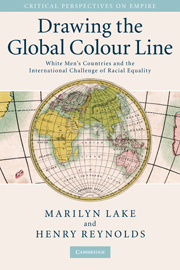 Drawing the Global Colour Line
Drawing the Global Colour Line Book contents
- Frontmatter
- Contents
- Acknowledgments
- Introduction
- Part 1 Modern mobilities
- Part 2 Discursive frameworks
- 2 The American Commonwealth and the ‘negro problem’
- 3 ‘The day will come’: Charles Pearson's disturbing prophecy
- 4 Theodore Roosevelt's re-assertion of racial vigour
- 5 Imperial brotherhood or white? Gandhi in South Africa
- Part 3 Transnational solidarities
- Part 4 Challenge and consolidation
- Part 5 Towards universal human rights
- Index
2 - The American Commonwealth and the ‘negro problem’
Published online by Cambridge University Press: 05 June 2012
- Frontmatter
- Contents
- Acknowledgments
- Introduction
- Part 1 Modern mobilities
- Part 2 Discursive frameworks
- 2 The American Commonwealth and the ‘negro problem’
- 3 ‘The day will come’: Charles Pearson's disturbing prophecy
- 4 Theodore Roosevelt's re-assertion of racial vigour
- 5 Imperial brotherhood or white? Gandhi in South Africa
- Part 3 Transnational solidarities
- Part 4 Challenge and consolidation
- Part 5 Towards universal human rights
- Index
Summary
James Bryce publishes a work of biblical authority
James Bryce's three volume survey of United States political and social institutions, The American Commonwealth, first published in 1888, revised in 1889 and re-issued in an expanded third edition in 1893–5, was ‘a study of an experiment in the rule of the multitude, tried on a scale unprecedently vast, and the results of which everyone is concerned to watch’. The American Commonwealth also played a key role in educating English-speaking peoples around the world about what he called the ‘negro problem’, which he defined as the unfortunate legacy of Radical Reconstruction, the ill-fated experiment in multi-racial democracy that followed the Civil War. In later writings, Bryce continually returned to the lessons of this episode in history, pointing to ‘the risks a democracy runs when the suffrage is granted to a large mass of half-civilized men’.
During the revolutionary project of Radical Reconstruction, between 1865 and 1877, the freed Negro, Bryce declared in an interpretation that would soon become orthodoxy, had proven himself completely unfit for the responsibilities of democratic citizenship. ‘Emancipation found them utterly ignorant; and the grant of the suffrage found them as unfit for political rights as any population could be’. In his book and related articles and lectures, Bryce became a key interpreter of southern white thinking for English-speaking peoples in Britain, North America, South Africa and Australasia.
- Type
- Chapter
- Information
- Drawing the Global Colour LineWhite Men's Countries and the International Challenge of Racial Equality, pp. 49 - 74Publisher: Cambridge University PressPrint publication year: 2008
- 1
- Cited by


